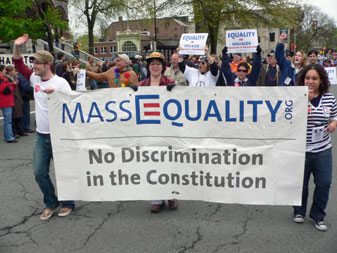June is Gay-Lesbian-Bi-Transgender Pride Month. Why do I care? Perhaps some of you have been wondering why a straight, married woman has such a queer blog. There are several reasons why this issue has become my particular passion.
On a personal level, I was parented by two women, and experienced firsthand how homophobia among our relatives and neighbors cut us off from an essential support network. When you can’t even admit that you are a family, you can’t ask your teachers or friends for help with family problems, which then are compounded by shame and isolation. Growing up with two very different women also taught me that there were diverse ways of being female. You could wear eyeshadow and long flowing blouses, read Victorian children’s stories, pretend to be a flamenco dancer, and swear like a longshoreman. You could wear motorcycle jackets, pump your biceps, and cook gourmet French meals. So naturally, at the age of six, I decided I wanted to be a pirate king. I still do.
There’s a scene in the Quentin Crisp bio-pic “The Naked Civil Servant” where an army recruiting officer is haranguing the young cross-dresser with the verse from Genesis, “Male and female created He them.” John Hurt, as Quentin, responds with an unflappable smile, “Male and female created He me.”
That’s how I feel, as an artist and a person who happens to have two X chromosomes. Until I discovered the notion of gender as performance, I thought I was an inadequate woman because none of the standard feminine archetypes fit me comfortably. Or rather, they all fit somewhat, and I didn’t want to choose between them. (This explains why my wardrobe is half man-tailored striped shirts and half hot-pink spandex.) Little princess, country wife, brainy girl, sexpot, corporate bitch. They’re all fun part-time, impossibly confining otherwise. Gender is like genre. When we live in subjection to a formula, it makes our art untrue.
Actually, before I got married and started using my body for something other than getting from place to place, most of the time I wanted the world to engage with me as pure mind, pure personality, a unique individual rather than a sexual stereotype. In other words, I wanted to be…a man. (Yeah, I blame the patriarchy. But it makes me hot, too.)
The point is, each of us is far more complex than a binary opposition or a set of costumes. It’s a lucky accident that I, being attracted to men, wound up in a female body. For the most part, our society now recognizes that such accidents should not determine whether I can go to school, give testimony in court, own property, or hold a job. Surely the opportunity to love another person, and seek social support to keep that love faithful and healthy, is more important than any of these.
So GLBT issues are my issues, as a subset of the feminist project of setting both men and women (and everyone in-between) free to relate to one another as fully human individuals, not as projections of a dominant group’s fears and fantasies.
My most important reason, however, is theological. Christian opposition to gay relationships is founded on a way of reading the Bible that I find legalistic and self-deceptive, with consequences that go far beyond this issue.
Let me say that I know devout Christians who are on the other side of this debate, who bear no hostility toward GLBT people and are genuinely pained that they have to preach the hard word of self-sacrifice and celibacy to this community. Liberal rhetoric about “compassion” and “fairness” misses the point because conservatives rightly elevate the Bible above secular political values. The latter group of Christians are also trying to be compassionate and fair, at least sometimes, but they’re convinced that their reading of texts like Romans 1:26-27 is the only one that properly maintains the Bible’s authority.
In practice, however, this means shielding the Bible from outside information (historical, scientific, literary, or psychological) that might force us to reinterpret the apparently “plain” meaning of the text. Information such as: Are today’s gay and lesbian partnerships different from the same-sex practices St. Paul was criticizing–as different, in some cases, as today’s heterosexual marriage is from prostitution and child abuse? From a Christian standpoint, is the relevant fact about Hellenistic sexual practices the gender of the participants, or their unequal power relations and connection to idol worship? If St. Paul condemned these acts because the science of his day considered them “unnatural”, should we change our valuation based on the growing evidence that homosexuality is an inborn and unchangeable trait, not a mere lifestyle choice?
Conservatives fear that these other sources of knowledge will displace the Bible, such that we begin judging and rejecting Christian beliefs based on their conformity to some secular ideology, rather than a Christ-centered worldview. As the spread of Enlightenment skepticism into liberal churches shows, this fear has some foundation.
However, the so-called literal interpretation is no less based on empirical data not found in the Bible–everything we know, or think we know, about the situations to which the Bible is being applied. There is no interpretive formula that can magically elevate the Bible to a pristine ahistorical position above the risks and responsibilities of applying it to an ever-changing and mysterious world. To believe otherwise is an insidious form of being our own savior, thinking we can get it right once and for all, and never have to listen to the Holy Spirit again.
By refusing to take in any wisdom from our own cultural moment, however imperfect (like all cultural moments) it may be, we only end up idolizing the cultural moment of 2,000 years ago, including all its scientific mistakes and arbitrary prejudices. Human history didn’t end there. Perhaps God had a good reason for that?
I recently took a psychological evaluation true-false test on which one of the questions was, “I know who is responsible for all my problems.” (The fact that I giggled at this one will probably count against my sanity assessment.) Something in our status-conscious primate brain is powerfully attracted to this statement. As theologian James Alison has written, the Christian message of universal sinfulness and unmerited grace constantly chafes against our instinct to shore up our selfhood by choosing a scapegoat. Jesus became the ultimate scapegoat in order to relativize all these systems of dominance. Compared to the gap between his perfect innocence and our culpability, any distinctions of merit among us are trivial. By forgiving us, he gives us a significance more real than anything we could establish by comparing ourselves to others. And that, my friends, is what upholds the authority of the Bible. Jesus–nothing more and nothing less.





